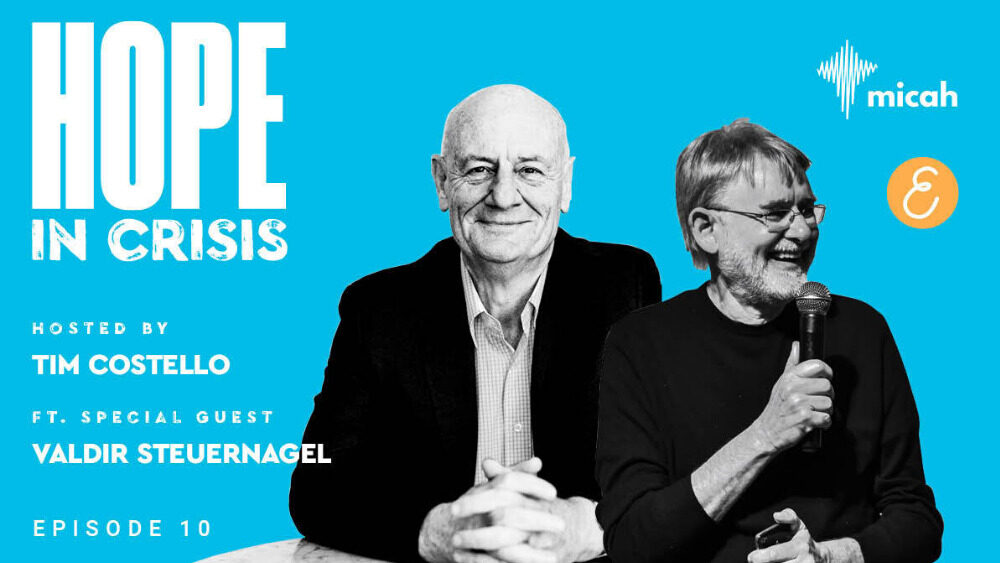Brazil is fast becoming the new epicentre of COVID-19. The country is now grappling with around 1000 deaths per day from the virus – the highest daily death toll in the world.
So far, the country has recorded more than 1.4 million cases of COVID and a total of almost 59,600 deaths – second only to the United States.
“It’s getting to the poorest of the poor. This is really a disaster.” – Valdir Steuernagel
If rates of COVID infection continue to climb at the same startling rate, by late July Brazil may overtake the US as the most affected country in the world.
As onlookers analyse how Brazil reached this deadly milestone, Tim Costello, host of Eternity‘s Hope in Crisis podcast, chatted with Brazilian pastor and theologian Valdir Steuernagel for the latest episode.
How did COVID spread so far and so fast?
“At first it was identified as a virus of the rich,” Steuernagel explains about COVID-19’s beginnings in Brazil. “So the first people who were contaminated were those who could do an international trip and come back [to Brazil] …
“With a second and third wave coming, we can see it reaching out to the poor, reaching out to the favelas [slums], reaching out to the Amazon …
“It’s getting to the peripheries … it’s getting to the Indian communities, it’s getting to the river communities, it’s getting to the poorest of the poor. And this is really a disaster.”
And yet, even while the rest of the world was employing measures to control the spread of this deadly disease, Brazil’s controversial President Jair Bolsonaro has been playing down its gravity.
He even went so far as to call the virus a “little cold”, and largely ignored the guidelines issued by his own health ministry (including lockdown measures).
“I remember a few years ago when Brazil was a success story, and just a few years after that, we are a test story,” laments Steuernagel. “Because at this point, you have together with the pandemic a new president with eroding leadership and you have a conflict between different expressions of power in Brazil.”
“I would say many in the church haven’t taken the virus seriously, and this has had consequences …” – Valdir Steuernagel
Where is the church in this crisis?
The church in Brazil is divided in its response to the COVID-19 epidemic, according to Steuernagel. Some churches have downplayed the virus because of their political alliance with the president. Others have set to work, helping local communities deal with the impact of the virus.
In order to understand this division, Steuernagel gives a brief history of the church in his country.
“What you have in Brazil is a long history of Catholic presence in our country. In more recent decades, you have a growing Evangelical Church.”
“In the last years, that Evangelical Church in different branches has become very visible and it’s a new phenomenon in our country, in our history. In fact, in the last election, the main expressions of that Evangelical Church provided strong support to the President of Brazil – that is, Bolsonaro.”
Steuernagel notes some of the factors underlying this political alliance for churches: “There’s tension for visibility, for money and for audience.” He says that churches have also felt “strong pressure” to open up for services, despite the risk of spreading the virus.
“So there has been a kind of close connection between that supporting church and the present government. So when you say that the President is not taking the virus very serious[ly], it spills over into expressions of the church too. So I would say many in the church haven’t taken the virus seriously, and this has had consequences in our context in Brazil. I say that with a sense of sadness.”
“Some of us hope and pray that this will be an experience for the church to recover some of the dimensions of the gospel of Jesus …” – Valdir Steuernagel
However, Steuernagel is quick to add that parts of the church have reacted very differently.
“I would say that there has been a big effort in this pandemic environment of different churches coming up with digital communication and really nurturing its own people.”
He notes the “many good stories” of different initiatives churches are employing to serve the community. One such project is in the city close to his home, which is serving more than 100 poverty-stricken children and their families.
“[In] over 70-75 per cent of that community, the people have lost their jobs and the children are without school. The houses are very poor. In that environment, we try to be present and help them to bring materials for the churches – helping them with food, helping them to bring signs of hope in their setting of desperation.”
Another church-driven social project in the Amazon is serving migrants from Venezuela.
“It’s trying to serve the poor communities with a model of transformational development, with a model of spirituality, that helps people to come together and to walk out of their experience of poverty,” says Steuernagel.
He adds: “So, Tim, there is hope, because we hope that the gospel is this message of hope for all of us.”
And, noting the biblical parable of the mustard seed, Steuernagel also has hope that the COVID crisis could even serve to bring the Brazilian church back together.
“Some of us hope and pray that this will be an experience for the church to recover some of the dimensions of the gospel of Jesus, to recover a sense of identification with the suffering people in Brazil and to recover a sense of ecumenical relations that brings less competition among ourselves and more desire to work together.”



